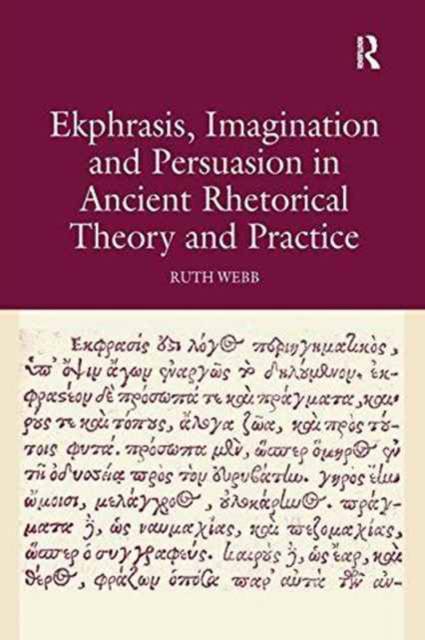
- Afhalen na 1 uur in een winkel met voorraad
- Gratis thuislevering in België vanaf € 30
- Ruim aanbod met 7 miljoen producten
- Afhalen na 1 uur in een winkel met voorraad
- Gratis thuislevering in België vanaf € 30
- Ruim aanbod met 7 miljoen producten
Zoeken
Ekphrasis, Imagination and Persuasion in Ancient Rhetorical Theory and Practice
Ruth Webb
Paperback | Engels
€ 122,45
+ 244 punten
Uitvoering
Omschrijving
This is a study of ekphrasis, the art of making listeners and readers 'see' in their imagination through words alone, as taught in ancient rhetorical schools and as used by Greek writers of the Imperial period (2nd-6th centuries CE). The author places the practice of ekphrasis within its cultural context, emphasizing the importance of the visual imagination in ancient responses to rhetoric, poetry and historiography. By linking the theoretical writings on ekphrasis with ancient theories of imagination, emotion and language, she brings out the persuasive and emotive function of vivid language in the literature of the period. This study also addresses the contrast between the ancient and the modern definitions of the term ekphrasis, underlining the different concepts of language, literature and reader response that distinguish the ancient from the modern approach. In order to explain the ancient understanding of ekphrasis and its place within the larger system of rhetorical training, the study includes a full analysis of the ancient technical sources (rhetorical handbooks, commentaries) which aims to make these accessible to non-specialists. The concluding chapter moves away from rhetorical theory to consider the problems and challenges involved in 'turning listeners into spectators' with a particular focus on the role of ekphrasis within ancient fiction. Attention is also paid to texts that lie at the intersection of the modern and ancient definitions of ekphrasis, such as Philostratos' Imagines and the many ekphraseis of buildings and monuments to be found in Late Antique literature.
Alleen bij Standaard Boekhandel
+ 244 punten op je klantenkaart van Standaard Boekhandel
Beoordelingen
We publiceren alleen reviews die voldoen aan de voorwaarden voor reviews. Bekijk onze voorwaarden voor reviews.








